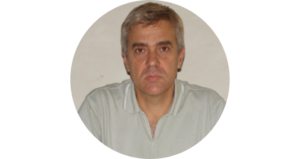
Residency Period: 08/01/2011 to 07/31/2012
Marcos A. Pimenta was born in Belo Horizonte, Brazil, on April 11, 1958. He obtained his master’s degree in physics from UFMG (Federal University of Minas Gerais), in Belo Horizonte. The subject of his master’s thesis was the study of incommensurable phase transitions by EPR (electron paramagnetic resonance) and his advisors were Profs. Ramayana Gazzinelli and Alaor S. Chaves. In 1985, he went to Orléans, France, and in 1987 he obtained his doctorate in physics from the Université d’Orléans. In his doctoral thesis, he worked with immeasurable and superionic phase transitions using infrared reflectivity and Brillouin scattering techniques, and his doctoral advisor was Prof. Francois Gervais. He became an adjunct professor at the Department of Physics at UFMG in 1989 and shortly afterwards created the Raman Spectroscopy Laboratory at the Department of Physics at UFMG. In 1997-1998 he spent a gap year working in Prof. Mildred Dresselhaus at MIT, where he made important contributions to the study of carbon nanotubes by Raman spectroscopy. Since then, he has been working at UFMG with carbon nanotubes and, more recently, with graphene.
He was coordinator of the National Nanotube Research Network (Ministry of Science and Technology) from 2006 to 2010 and currently coordinates the National Institute of Science and Technology (INCT) of Carbon Nanomaterials. In 2002, he became Full Professor at UFMG. He has supervised around 20 postgraduate theses and dissertations and has published more than 160 scientific articles, which have been cited more than 7000 times. He is also a musician and guitarist, having released a CD with his own compositions in 1997.
WHAT IS NANOTECHNOLOGY AND WHAT IS IT FOR?
Nanotechnology has a transdisciplinary character, since it breaks down the boundaries between the basic sciences (physics, biology and chemistry), gives rise to technological applications in engineering, medicine and agriculture, and involves legal, social and economic issues. As it will certainly affect the lives of all citizens, informing society of the positive and negative aspects of nanotechnology is a task of great relevance. During this year of residency at the IEAT, I will seek ways to disseminate nanotechnology concepts to a lay audience and produce materials that allow the transmission of this knowledge to society.